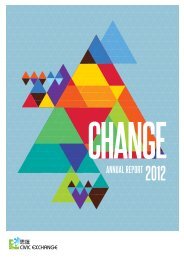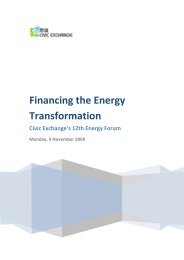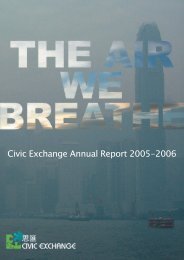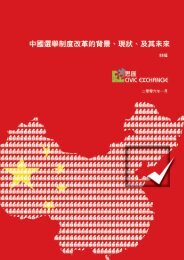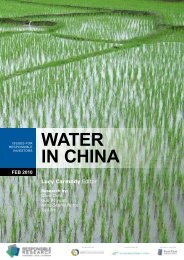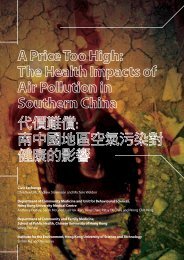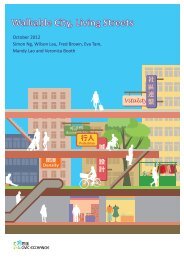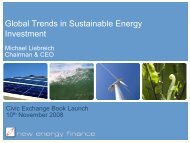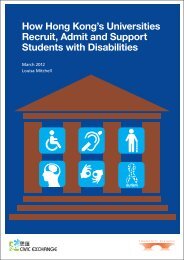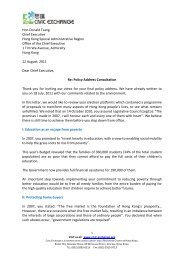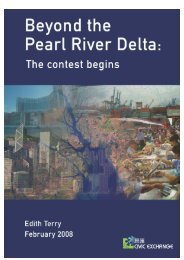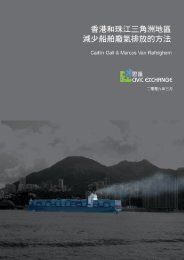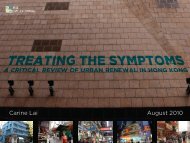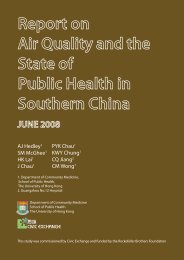Untitled - Civic Exchange
Untitled - Civic Exchange
Untitled - Civic Exchange
You also want an ePaper? Increase the reach of your titles
YUMPU automatically turns print PDFs into web optimized ePapers that Google loves.
Chapter 3:<br />
Road versus Rail - Financing Mass Transit in Hong Kong<br />
considerable improvements in local air quality, noise pollution, and congestion. In our view, the<br />
exceptionally high external effects of road traffic mean that an essential part of making Hong Kong's<br />
transport more sustainable is to get a greater proportion of travelers off the roads entirely.<br />
A key factor in the choice of transport modes is, of course, the costs and benefits as seen by prospective<br />
users of each mode. In general, there is a significant difference between "private" costs and benefits and<br />
overall "social" costs and benefits. In other words, there is an important distinction between the internal<br />
costs and benefits from the perspective of individual travelers and the costs and benefits that are external<br />
to the individual but affect others.<br />
For example, when using a private car on a congested road a driver experiences only the average "cost" of<br />
the slowdown in traffic and reduction in air quality associated with his/her choice of mode. Yet the decision<br />
to travel by car not only means s/he travels more slowly and breathes dirtier air, but also increases travel<br />
time and reduces air quality for many other people. Normally, drivers do not consider the impact of the<br />
decision to drive or take public transport for everyone else on the road. In other words, the impacts (costs)<br />
to others of private car use in terms of traffic congestion and pollution are likely to be external to the<br />
decision to use a car rather than take a bus or railway.<br />
The same logic applies to the choice of electric-powered rail transport versus internal combustion engine<br />
(ICE) public road transport. While rail offers certain features for which passengers are willing to pay (e.g.,<br />
speed, reliability), many of its benefits (e.g., no local air pollution, reduced noise, less congestion on the<br />
roads) are positive for others but do not accrue directly to passengers themselves. Hence, such benefits are<br />
likely to be external to a passenger's decision to travel by rail. The choice to travel by rail versus bus is<br />
likely to be determined primarily by the relative costs and benefits strictly as seen by prospective<br />
passengers, rather than by whatever external benefits railway provides to society as a whole.<br />
Therefore, it can be argued that some form of public sector intervention is needed in order to bring these<br />
kinds of external considerations into decision-making. 55 Bus and rail fares are greatly influenced by<br />
government transport financing policy. While the Hong Kong government claims that no mode of transport<br />
is subsidized directly, the reality is that government policy is a major factor in the level of private costs<br />
(fares paid, convenience of access) for transport users in Hong Kong. Such policy is far from neutral.<br />
3.3 Transport financing in Hong Kong<br />
In the fiscal year 1999-2000, total expenditure for roads in Hong Kong amounted to HK$3.8 billion, of<br />
which HK$3 billion was for construction. 56 For the same period, total government revenue from vehicle<br />
licensing and registration, plus that from road fuel duty, was HK$8.8 billion. Just over 60% of this came<br />
from vehicle licensing/registration, 57 and the remainder from road fuel duty. 58 To the extent that these<br />
figures reflect relevant expenditures and revenues, as a group, road users in the HKSAR appear to more<br />
than fully pay the internal (financial) cost of construction and maintenance of the roads they use.<br />
55 Barron, W., Perlack R., and Boland J. (1998), Fundamentals of Economics for Environmental Managers,<br />
Westport, Connecticut: Greenwood Press.<br />
56 Highways Department website, , HKSAR Government, January 3,<br />
2001.<br />
57 HKSAR Government (2001), Hong Kong 2001.<br />
58 Hong Kong Customs & Excise Department, personal communication from Y.M. To (for the Commissioner of<br />
Customs & Excise) to Simon Ng, March 23, 2001.<br />
19



